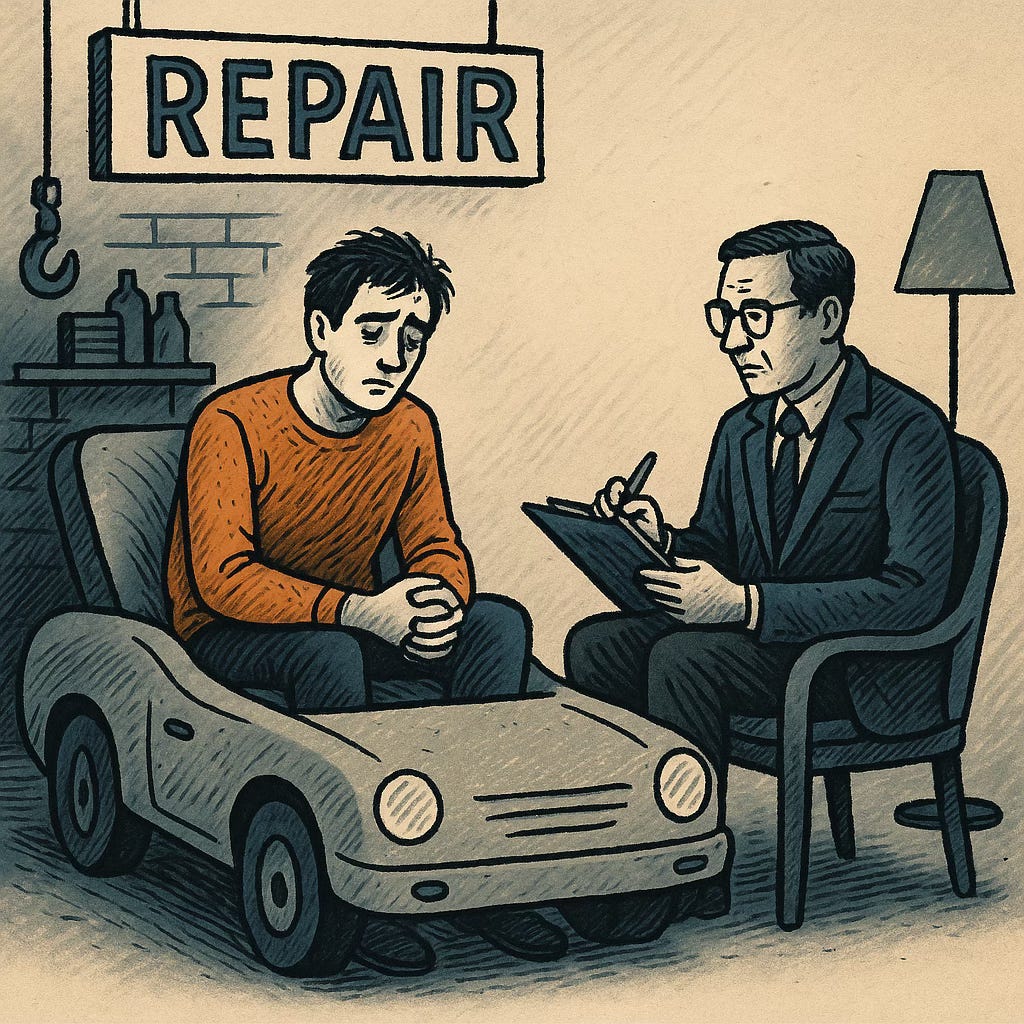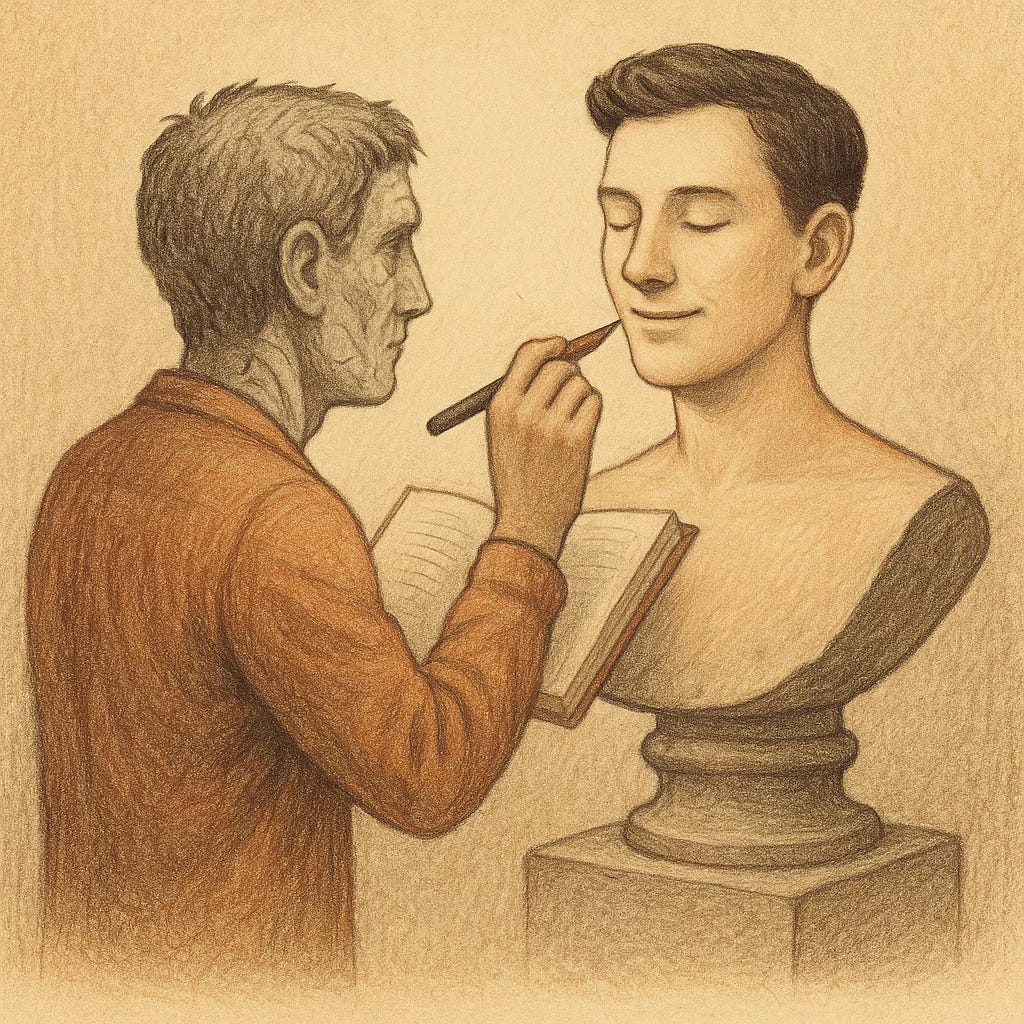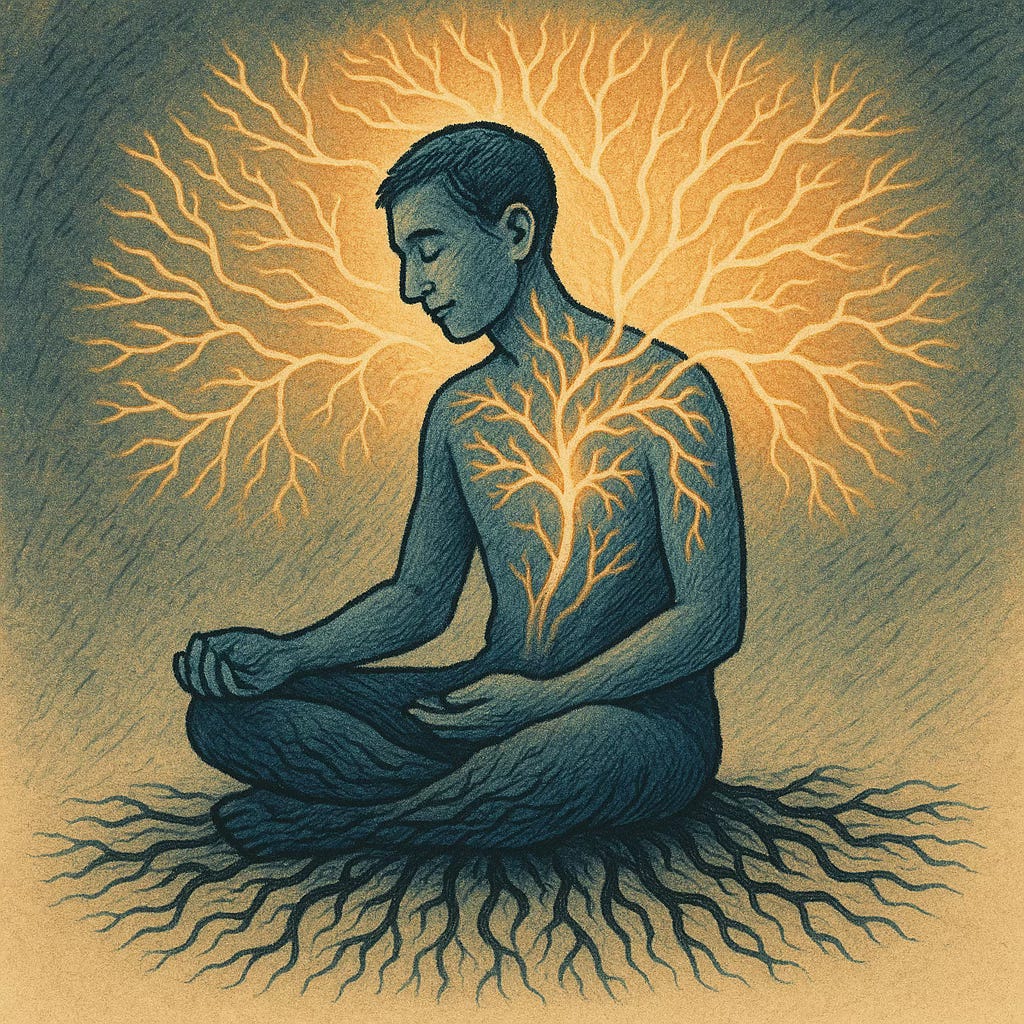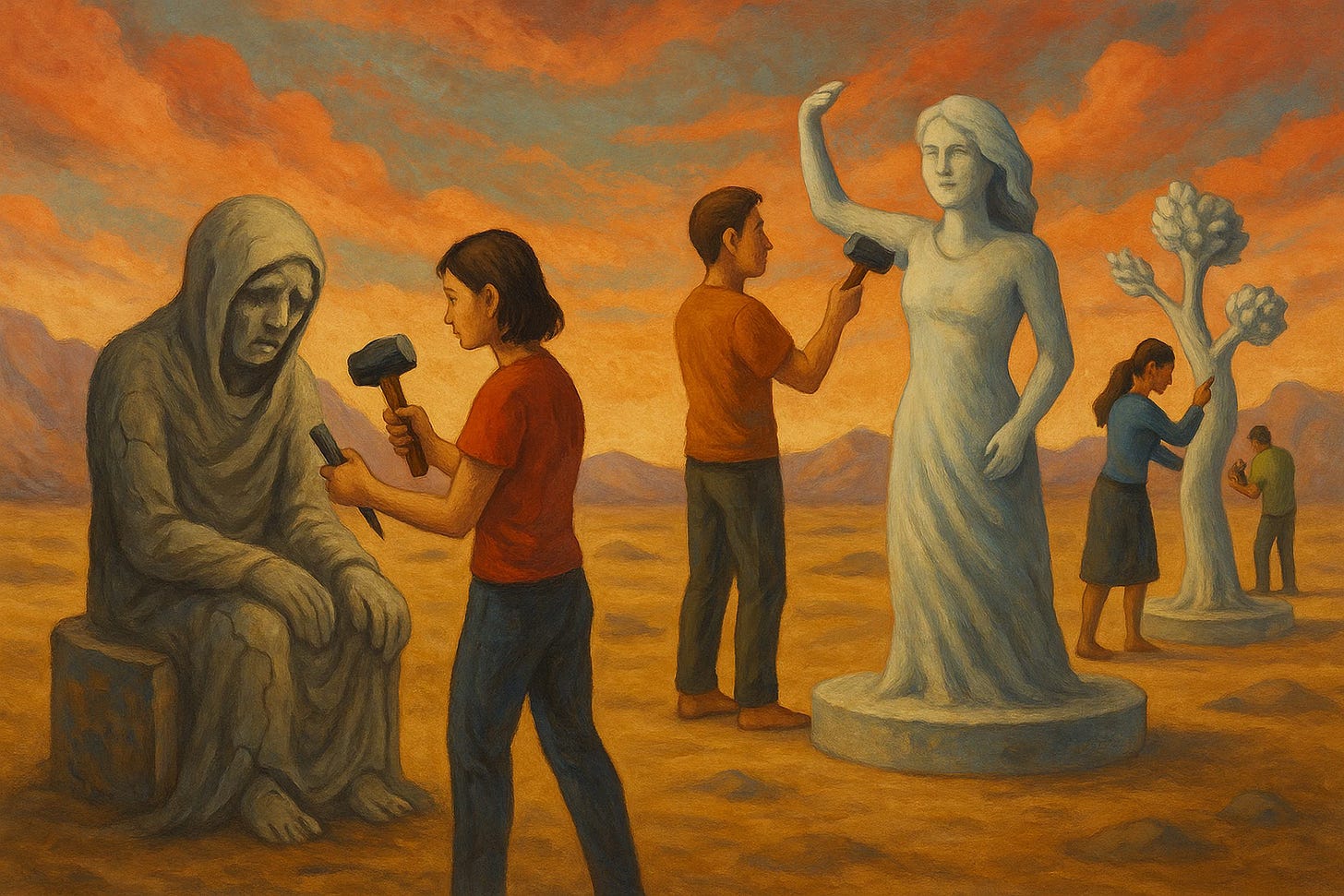Good Therapy Should Do More Than Just Heal
Why the future of transformation belongs to those who master perception, presence, and authorship
I’ve lost a few clients over what I’m about to tell you…
But I so strongly believe in it and have thousands of other satisfied customers as well as my own lived experience and scientific studies to back me up so let’s do this.
For starters, they've been selling you therapy like it's a repair shop for broken humans.
Roll in with your damage, get some professional tinkering, maybe a few coping mechanisms, and limp out "functional" enough to keep the lights on. The whole industry built on the premise that you're fundamentally flawed merchandise requiring expert restoration.
What exquisite horseshit. And I’ve never bought into it, not as a human, nor as a licensed clinician and I’m cocky enough to believe it’s one of the biggest factors to my “success” with clients.
What they don't tell us at those continuing education seminars (where therapists gather to learn increasingly sophisticated ways to pathologize the human experience): You are not a problem to be solved. You are a reality to be authored.
And the difference between those two approaches? It's the difference between surviving and actually fucking living.
The Great Therapeutic Lie
For decades, the mental health establishment has peddled a particularly insidious form of intellectual colonialism: the belief that healing happens through excavation, analysis, and "processing." As if your psyche were some archaeological dig site requiring careful brushing and cataloging of ancient trauma shards.
This model creates professional archaeologists and lifelong patients. It generates insight without transformation, understanding without agency, and… most devastatingly… clients who become connoisseurs of their own dysfunction rather than architects of their liberation. Sorry not sorry. Someone needs to shout this from the proverbial rooftops!
I've watched brilliant individuals spend years in therapy becoming increasingly articulate about their patterns while remaining utterly “powerless” to change them. They can recite their childhood wounds with PhD-level precision, but they can't author a Tuesday that feels good enough to want to do it again.
The therapeutic industrial complex has convinced us that healing is about looking backward when the real revolution happens when you learn to look through different eyes entirely. Read that again.
Enter the Participatory Self
What if I told you that neuroscience, quantum theory, and narrative psychology have been having the same conversation for decades—and it's a conversation about your power to literally reshape reality through perception?
Not metaphorically. Not symbolically. Literally.
Your brain is not a passive recording device. It's a prediction machine that filters, edits, and constructs your experience based on prior conditioning. Karl Friston's research on predictive processing reveals what mystics have known for millennia: you don't see things as they are, you see them as YOU are. Your nervous system is running a continuous simulation of reality based on past data, and that simulation becomes your lived experience.
Attention is creative force. The observer effect demonstrates that consciousness and reality are intimately entangled; what you observe with awareness literally changes! I cannot stress this enough! When clients learn to witness their internal experience without immediately identifying with it, the experience itself begins to shift. This is measurable neurobiology, not wishful thinking.
Identity is narrative construct. Dan McAdams' research on narrative identity shows that who you believe yourself to be is a story—culturally inherited, trauma-informed, but ultimately editable. And here's the revelation that should terrify the "you are your diagnosis" crowd:
When you change the story, you change the person.
The Science of Authorship
Memory reconsolidation research has been sitting in academic journals for years, quietly demolishing everything the therapy world thinks it knows about healing. Every time you recall a memory while experiencing a different emotional state, you literally rewrite its neurological encoding (hello EMDR).
The past isn't carved in stone; it's written in sand, and the tide of your present awareness can reshape the entire coastline.
This explains why so much traditional therapy creates eloquent prisoners rather than free people. You spend session after session reactivating traumatic memories while swimming in the exact same emotional soup that encoded them originally. As I like to tell clients:
WHAT YOU THINK ABOUT, YOU FEEL ABOUT. AND WHAT YOU CONSISTENTLY FEEL ABOUT, YOU’LL ACT OUT.
If not done well, you're not just processing; you're practicing your pain, rehearsing your limitations until they become your most fluent language. You’re literally recapitulating your pain and creating ongoing habits.
The alternative?
When clients learn to touch difficult memories from a place of embodied strength, genuine curiosity, or fierce self-compassion, they discover something extraordinary. Instead of just rehashing old wounds, they're actively editing their relationship to their own history.
And let me be clear, this isn’t bypassing bullshit or somehow acting like the trauma didn’t occur in the first place. I don’t believe in gaslighting yourself into a perceived peace that likely won’t last. It’s about shifting how you view yourself in the HERE AND NOW to be able to consciously choose a future that isn’t limited by what happened to you in the past.
What This Actually Looks Like
In my practice, we don't spend months exploring why you developed coping mechanisms. We identify which ones are still serving you and which ones need elegant retirement. We don't analyze your family of origin dynamics ad nauseam; we track how those patterns show up in your nervous system today and teach you to interrupt them in real time.
When a client says, "I always sabotage good relationships," we don't necessarily have to dig into childhood attachment wounds and we sure as shit don’t stay there. (If that’s your thing though, cool. I’m here for whatever works for you.)
We examine:
What is your nervous system predicting about intimacy?
What story is running automatically when connection deepens?
And most importantly: who authored that prediction, and are they still qualified to be making decisions about your love life?
This work requires a particular kind of courage: the willingness to question not just what happened to you, but who you've decided to become because of it.
Because here's the thing: your nervous system is brilliant at pattern recognition, but it's terrible at expiration dates. It will run a protection program designed for a five-year-old's reality well into your forties and beyond if you let it.
Some of the saddest sessions I’ve ever had, and if I’m honest, the ones that haunt me as an existential therapist, are the ones with those now in their sunset years, too late to have the experiences they wish they’d given themselves, and now working to make peace with the ones they did instead.
The Radical Reframe
Listen, I spent the first thirty years of my life as a professional shape-shifter, editing myself for approval from a God I could never quite please and a community that rewarded my disappearance. I was fluent in fire and fear, worship songs and anxiety—a big personality crammed into a little box, constantly betraying myself for belonging.
The breaking point came when I found myself sobbing in the shower so my daughters wouldn't hear, angry and grieving and mortified that I'd become a ghostwriter for someone else's salvation fantasy. That's when I realized: if I was going to suffer, I damn well wanted it to be in pursuit of something real.
The moment I stopped outsourcing my worth to churches, men, and institutions—the moment I became the author of my own life instead of performing someone else's script, EVERYTHING changed. While a magical cure certainly would’ve been nice, my situation finally changed when I stopped treating myself like a problem to be solved and started treating myself like a reality to be created.
Now when clients sit across from me, convinced their anxiety or depression or perfectionism is evidence they're fundamentally broken, I recognize the pattern immediately. It's the same lie I believed for decades: that your internal experience is something happening TO you rather than something you have the power to participate in shaping.
So when “Maria” tells me her panic attacks feel incurable, I lean in with the kind of fierce curiosity I wish someone had offered me during my own unraveling. “What if your nervous system is trying to save you from betraying yourself again?" Because that's exactly what was happening; her body was staging a revolt every time she was about to people-please herself into oblivion.
This is the work I wish someone had offered me when I was suffocating in my own perfectly curated prison: teaching people to stop being tourists in their own lives and start being the authors of their own liberation.
The Liberation Protocol
Real transformation happens when three elements converge:
Somatic Awareness: Learning to track sensation without immediately creating meaning from it. Your body holds wisdom, yes, but it also holds outdated alarm systems. Discernment is everything.
Perceptual Flexibility: Recognizing that your current interpretation of events is one possibility among many. Not "positive thinking," but cognitive sophistication—the ability to generate multiple narratives and choose the most empowering one.
Narrative Agency: Understanding that the story of who you are is not a fixed biography but an ongoing creative project. Instead of discovering your "true self;” you're actively constructing the self you want to inhabit… and that, my friend, makes all the difference in the world!
When clients finally understand this, I usually see them sit back in their chair with this look that’s part relief, part mischief. It’s my favorite. Like they just realized they've been playing a game with rules nobody actually gave them permission to enforce.
The Invitation to Author
Here's what I know after years of watching people transform: the ones who change fastest aren't the ones who spend decades excavating their childhood. They're the ones who wake up one Tuesday and decide they're tired of living like supporting characters in their own story.
They're the ones who stop asking "Why am I like this?" and start asking "Who do I want to become?" They quit treating their quirks and struggles like character flaws and start seeing them as raw material for something interesting.
The pen has always been in your hand. The question is: are you finally ready to write something that sets you free?

If you're ready to move beyond therapeutic archaeology and into reality authorship, the conversation starts here.







